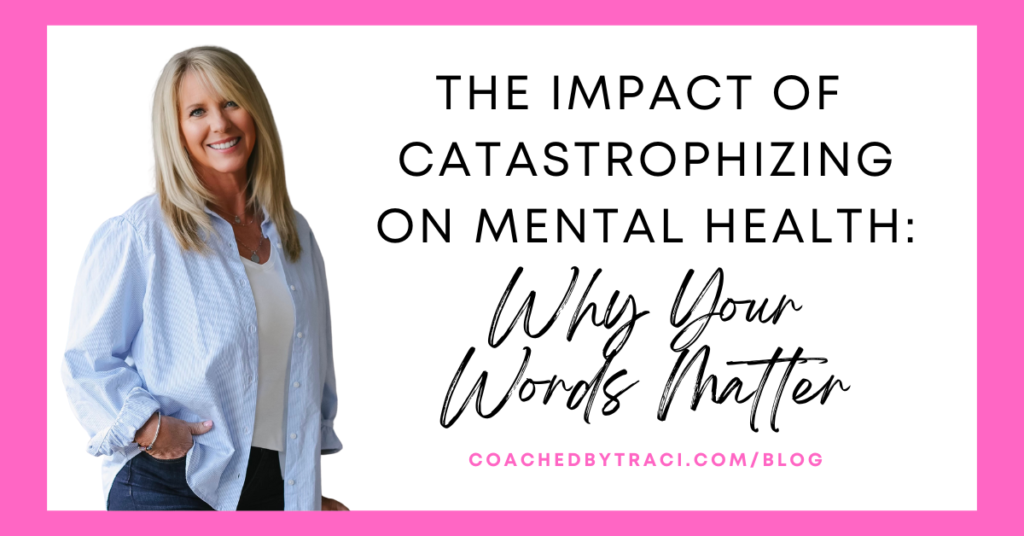We’ve all had those moments when it feels like everything is going wrong and we say things like, “You can’t trust *anybody*,” or “This is the *worst* thing that could ever happen!” These exaggerated statements might feel harmless in the moment, but in reality, they can wreak havoc on our mental health. When we catastrophize and generalize, we condition our brains to respond with anxiety, fear, and hopelessness.

The Power of Language and Its Effect on Your Brain
Our words are not just sounds that fill the air; they carry energy, emotions, and deep psychological impact. When you say, “*Everything* is going wrong,” your brain picks up on this message, amplifying emotions like stress, sadness, and fear. Even if only one aspect of your life is difficult, by saying it affects *everything*, you trick your mind into believing it’s true. Your brain doesn’t differentiate between reality and the catastrophic picture you’ve painted; instead, it floods you with negative emotions as if the exaggerated scenario were real.
The Role of Media and Negative Consumption
We live in an era where information is at our fingertips 24/7. Whether it’s breaking news about a political crisis, a natural disaster, or rising crime rates, it’s easy to become consumed by negativity. While it’s important to be informed, there’s a tipping point where constant exposure to bad news affects your mental health. When you fill your mind with stories of things beyond your control—such as wars, politics, and global conflicts—you create a cycle of suffering in your own life.
This mental overload can make you feel powerless and frustrated, adding unnecessary layers of stress and anxiety. Instead of feeling hopeful or motivated to make changes, catastrophizing leads to a sense of helplessness, where everything feels like it’s spiraling out of control.
Suffering Breeds More Suffering
When you allow yourself to dwell in this state of mental suffering, you add to the collective negativity of the world. You’re no longer just responding to what’s happening; you’re contributing to the emotional chaos by spreading the energy of fear, distrust, and despair. And while it’s true that we can’t control external factors—like politics, other people’s actions, or global events—we can control how we respond.
The truth is, our responses to these uncontrollable events shape not only our mental health but also how we show up for others. Compassion and empathy are powerful tools that can shift our perspective. Instead of spreading negativity, focusing on positive, proactive actions—like prayer, kindness, or community service—creates better energy for both yourself and those around you.
3 Tips to Stop Catastrophizing and Manage Your Mental State
1. Watch Your Language: Stop Exaggerating and Generalizing
One of the quickest ways to stop catastrophizing is to pay attention to your language. The words we use have the power to shape our reality. Instead of saying, “This is the *worst* day ever,” try reframing it: “Today has been challenging, but I’ve handled difficult days before.” Notice how this simple shift keeps you grounded in reality and reduces the emotional intensity.
Also, avoid generalizing. When we say things like “*Nobody* can be trusted,” we close ourselves off from positive relationships. Instead, recognize that while *some* people may have hurt you, others still deserve your trust. Use specific language that accurately reflects the situation, not blanket statements that create unnecessary fear or anger.
2. Limit Your Intake of Negative News
In today’s hyper-connected world, it’s easy to become overwhelmed by the constant flow of negative news. Set boundaries for how much news you consume daily, and take breaks from social media when it becomes too much. Seek out positive stories or spend more time engaging with uplifting content that helps restore your sense of balance.
If you’re feeling anxious about world events, focus on what you *can* control—your actions, your kindness, and how you treat those around you. This will reduce feelings of helplessness and restore a sense of empowerment.
3. Practice Mindfulness and Compassion
When you start to feel overwhelmed by external events or personal challenges, take a moment to breathe and ground yourself in the present. Mindfulness allows you to become aware of your thoughts and emotions without getting swept away by them. You can acknowledge a difficult situation without letting it consume your entire outlook on life.
Practicing compassion—both for yourself and others—can also transform your mental state. Instead of catastrophizing, use empathy to approach situations with understanding. Remind yourself that suffering is a shared human experience, and you have the power to offer positivity through prayer, support, or simple acts of kindness.
Catastrophizing may seem like an automatic response to difficult situations, but it’s one that can have serious consequences for your mental health. By watching your language, limiting exposure to negative news, and practicing mindfulness and compassion, you can reclaim control over your thoughts and emotions. Remember, suffering is a choice, and how you react to the uncontrollable world around you can either add to or diminish the pain. Choose wisely. Choose compassion. Choose peace.